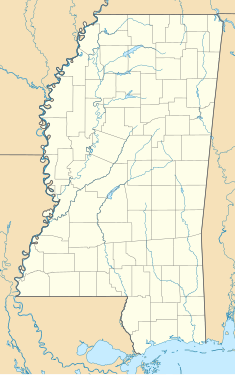Hurricane Plantation
| Hurricane Plantation | |
|---|---|
 The library pavilion at Hurricane, one of the only structures to survive the destruction of the main house by Federal troops. | |
| Location | Davis Bend, Mississippi |
| Founded | 1824 |
| Built | 1827 |
| Built for | Joseph Emory Davis |
| Demolished | June 24, 1862 (burned) |
| Architectural style(s) | Neoclassical |
| Governing body | Private |
Hurricane Plantation located near Vicksburg, Mississippi, was the home of Joseph Emory Davis (1784–1870), the oldest brother of Jefferson Davis. Located on a peninsula of the Mississippi River in Warren County, Mississippi called Davis Bend after its owner, at its zenith Hurricane comprised more than 5,000 acres (20 km2) with approximately 5 miles (8.0 km) of river frontage worked by hundreds of slaves. Joseph Davis was the owner of 346 slaves and had a personal worth of more than $600,000 in the 1860 U.S. Census, easily making him one of the wealthiest men in the state of Mississippi.
Joseph Davis, who had several legally acknowledged illegitimate daughters but no legitimate children, had served as de facto guardian for his brother Jefferson Davis, who was more than 20 years Joseph's junior and who regarded him as a father figure. Joseph Davis gave Jefferson the full use of more than 1,000 acres (4.0 km2) adjoining Hurricane in the 1830s, a bequest Jefferson Davis named Brierfield. Specific details are uncertain as Joseph Davis, though an attorney, never made the bequest to his brother permanent or public nor did he ever supply him with the deed, though Jefferson Davis and later his wife and children occupied Brierfield until the beginning of the Civil War in 1861.
Joseph Davis relocated with members of his family and a few of his slaves to Tuscaloosa, Alabama, after the fall of New Orleans to Federal troops and the increasing military presence near Vicksburg. The mansion at Hurricane, a three story main house with two large semi detached wings for entertaining, a detached library, and numerous outbuildings, contained indoor plumbing and an early form of air conditioning; the residence was described in detail in the memoirs of Varina Davis (Jefferson Davis's second wife). The main house was burned by Federal troops in 1862 and the plantation looted numerous times by both armies during the campaign of Vicksburg; only the library, a building independent of the main house, survived the war.
After the war Joseph Davis sold the property to Ben Montgomery, a former slave, financing it on a long term note which his heirs later foreclosed upon when Montgomery was unable to make payments due to declining cotton prices and floods. Confusion as to the titles to the properties led to lawsuits between Jefferson Davis and his brother's heirs, with Jefferson ultimately gaining title to the Brierfield property and Joseph's grandchildren (the issue of a legally acknowledged illegitimate daughter of Joseph Davis) receiving Hurricane.
A canal originally cut across the peninsula for flood control and later claimed by the main channel of the Mississippi River changed the named of the peninsula to Davis Island. Neighboring Brierfield Plantation,[1] the plantation home of Jefferson Davis, burned in 1931.[2]
Sources
- ^ Lynda Lasswell Crist. "Jefferson Davis (1808-1889)". Mississippi History Now.
- ^ "Historical Markers Placed By MSSDAR". Daughters of the American Revolution. Retrieved 2013-08-07.

